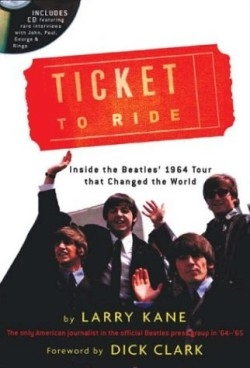
Ticket to Ride
Inside the Beatles' 1964 Tour that Changed the World
The year 1964 may have seemed quiet compared to those that followed, but several events-the Civil Rights Act and protests, the Gulf of Tonkin Resolution, a divisive presidential campaign, and the national mourning of the assassinated President Kennedy-set the nation on its path of social, cultural, and political upheaval. That year, at age twenty-one, the author, then news director for WFUN Radio in Miami, became the only American reporter to travel with the Beatles during their two memorable tours of North America during the summers of 1964 and 1965. Later he would enjoy a distinguished thirty-seven-year career as a Philadelphia news anchor, which he tells about in his engaging memoir, Larry Kane’s Philadelphia.
Kane was invited on tour by Beatles manager Brian Epstein in response to Kane’s request for an interview. He was surprised but delighted to be offered the chance to join the Beatles for what he calls the “greatest tour in rock-and-roll history.” The Beatles performed at thirty-eight concerts and crossed North America four times during those two summers. Security was the major challenge at each concert. Hundreds of screaming fans rushed the platform in Vancouver, which resulted in 135 people suffering broken bones and concussions. The Beatles and Kane were nearly mauled in the fracas.
The book includes entertaining reminiscences from baby boomers who were at the concerts and whose Beatlemania has not diminished. It is accompanied by a one-hour CD featuring Kane’s interviews with the Beatles. These lively sessions show the band members to be forthright and lacking pretense, two qualities that endeared them to their fans. The listener learns not only how much the Beatles meant to their fans but also how much the fans meant to the Beatles. One interview reveals John Lennon, at the age of twenty-three, as an emerging spokesman for peace, which remained his most important cause until his murder in 1980.
The Beatles and Kane enjoyed a friendship based on the group’s awareness that he was a trustworthy reporter, while Kane gained an appreciation for the Beatles’ music and their pranks, often at his expense. The Beatles toured only during 1963-66, which Kane believes was fortunate because it gave the Beatles time to record some of the most memorable albums of the era, notably “Sergeant Pepper” and the “White Album.”
Kane says that the question he is asked most frequently is “What were the Beatles really like?” Responding, “they were decent, caring, nice people who were even richer in character than they ever would be in financial success,” he offers a warm account of his working, talking, and laughing with these icons of rock music, as he kindly shares his ticket with readers who come along for the ride.
Reviewed by
Karl Helicher
Disclosure: This article is not an endorsement, but a review. The publisher of this book provided free copies of the book to have their book reviewed by a professional reviewer. No fee was paid by the publisher for this review. Foreword Reviews only recommends books that we love. Foreword Magazine, Inc. is disclosing this in accordance with the Federal Trade Commission’s 16 CFR, Part 255.
